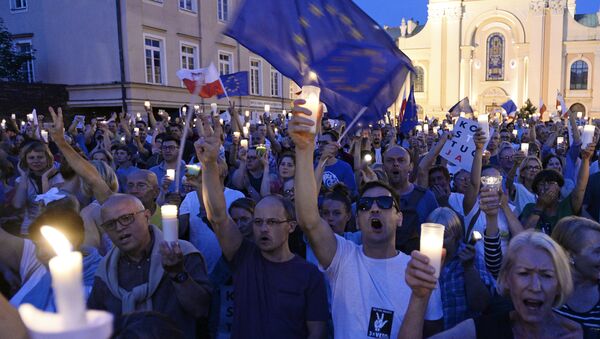In another development, the European Council president and former Polish prime minister, Donald Tusk, said in a statement that the controversial reforms of the Polish judicial system will destroy the already tarnished public opinion across Europe about democracy in the country, as they will reverse decades of progress.
"Bringing the courts under the control of the governing party in the manner proposed by the Law and Justice Party (PiS) will ruin the already tarnished public opinion about Polish democracy. We must therefore find a solution which will be accepted by the Poles, the parliamentary majority and the opposition, the president and the European Union," Tusk said.
Protests held in Poland over changes to supreme court https://t.co/BLwRnSiBiC pic.twitter.com/bRItvvmK0n
— Politics Newz (@PolticsNewz) 22 июля 2017 г.
Tens of thousands of Polish citizens took to the streets on July 21, when the bill was considered by the Polish parliament. Despite the massive protests, the document was approved and is expected to be signed into law by the country's president, Andrzej Duda, before the end of this week.
Like Tusk, the mainstream media immediately accused Poland's conservative government of trying to destroy democracy.
Speculating on "why Poland adopts such a contradictory law now", Time magazine's Tara John said that "it is part of a wider campaign to dismantle the country's democratic checks and balances on the government by the populist Law and Justice party, co-founded and chaired by former Prime Minister Jaroslaw Kaczynski."
According to John, since receiving a parliamentary majority in 2015, Law and Justice representatives "have effectively turned the country's state media into a propaganda arm, purged the army's leadership, placed loyalists in the civil service and weakened the Constitutional Tribunal which rules on whether legislation violates Poland's constitution."
The Washington Post, in turn, published an article by Berlin-based reporter Isaac Stanley-Becker titled "Poland’s long march toward democracy is threatened by quick steps away from it."
Thousands protest in Poland after controversial Supreme Court bill passed https://t.co/ubLskA7NPd pic.twitter.com/ZmrZyd02t7
— dwnews (@dwnews) 21 июля 2017 г.
Some media outlets drew attention to the "standoff" that currently takes place between Warsaw and Brussels.
"Poland appears heading toward a major showdown with the European Union after the country’s ruling Law and Justice party rammed a hotly-contested judicial reform bill through parliament Saturday," Foreign Policy said, while the Atlantic magazine called Poland "the EU's Next Big Test."
Poland. Major protest against bill forcing all Supreme Court judges to step down — except those the President likes. #NotADemocracy pic.twitter.com/lbjCwmPMtp
— ian bremmer (@ianbremmer) 21 июля 2017 г.
Both outlets recalled a recent statement by the vice president of the European Commission, Franz Timmermans, who announced Brussels' readiness for an unprecedented step, namely, the initiation of the seventh article of the Lisbon Treaty, according to which Warsaw can be sanctioned and deprived of its voting rights in the Council of the EU.
The Polish government rather sharply reacted to the "threats" by Timmermans. A representative of the Law and Justice Party, Stanislav Pieta, said that Timmermans' remarks did not impress him, while his colleague Zdzislaw Krasnodebski accused Brussels of trying to put psychological pressure on the government.
Thousands protest in Poland to keep Supreme Court out of under Government control https://t.co/p7mPCRcXi9 #tcot
— Real Erin Cruz❤️🇺🇸 (@WAGNERGIRLE) 24 июля 2017 г.
To impose sanctions against Warsaw, the approval of all member countries of the European Council (except Poland) is necessary.
Notably, at the beginning of this year when the Law and Justice party adopted another controversial law related to state media activities, Hungarian Prime Minister Viktor Orban said that he would veto any measures against Poland. Now a similar situation can happen again, experts said.
Adekoya recalled that in the 13 years since Poland joined the EU, it has received 135.7 billion euros in EU funds, an average of 10 billion euros a year, far more than any other member state."
"As long as that cash flow continues unhindered, Kaczynski and his party couldn't care less what EU officials think about their actions. To them, Brussels is run by fanatical lefties who hate them because they are a conservative party," he concluded.




